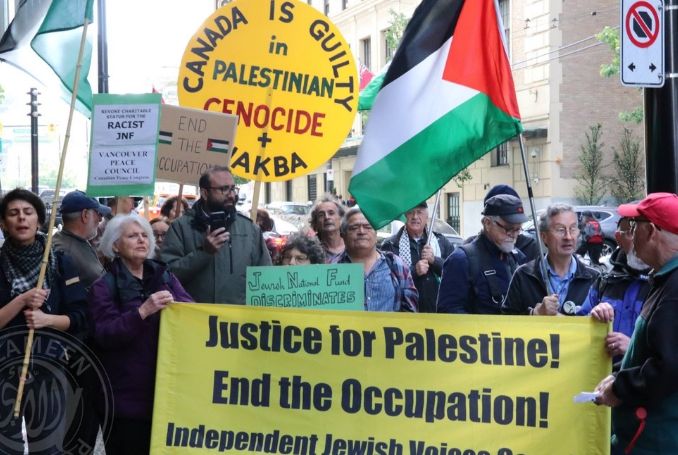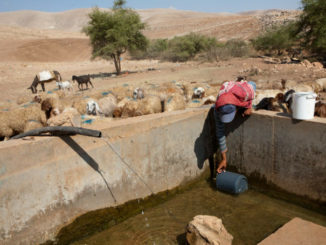
By Marion Kawas
The federal election in Canada is coming up on October 21, 2019, and once again there is a debate, both within the Palestinian community and the solidarity movement, on the best tactics and strategies to hold politicians to account. Parameters have shifted dramatically since 2015; four years ago, current PM Justin Trudeau of the Liberal Party was still a shiny new commodity with untested big promises, and the Trump/Netanyahu racist “shock and awe” assault had yet to launch. Successive Canadian governments have been complicit in dispossessing Palestinians for over 70 years now, a legacy that has cut across party lines; activists are more determined than ever that politicians will not escape responsibility for their callous and racist anti-Palestinian stands.
Trudeau has lost credibility with many in Canada who thought he would bring a fresh perspective to foreign policy, especially on the issue of support for Palestinian rights. His government has voted the same way as the previous Conservative one at the United Nations on multiple resolutions, and one Liberal MP even bragged that the Trudeau government’s record surpassed its predecessor and was “almost identical” to the U.S. in protecting Israel; they helped pass a nasty anti-BDS motion in the House of Commons which condemned even individuals who support boycotting Israel; and a government minister wrapped it all up by endorsing the dangerous IHRA definition of anti-Semitism in June of this year. The government also reversed an initial decision by the Canadian Food Inspection Agency on the correct labeling of settlement wines, something that was successfully challenged in Federal Court with a recent ruling that determined the “Product of Israel” label was “false, misleading and deceptive”; whether there will be an appeal of this court decision has not yet been announced.
Meanwhile, the opposition New Democratic Party under the helm of new leader Jagmeet Singh has been sending extremely mixed signals as to where their position stands. The party voted against the federal anti-BDS motion, has expressed clear reservations about the IHRA definition, and their recent statement welcoming the court decision on labeling of settlement wines was timely and, in the landscape of Canadian politics, could be considered strongly worded. However, they also blocked a pro-Palestine resolution at their national conference in 2018 and again at a provincial Ontario NDP conference in May of this year. And they have already “de-nominated” one new candidate, Rana Zaman, for comments made about the Palestinian Great Return March (a pattern started in 2015).
Such political opportunism seems to have gripped the Green Party as well. There is a good resolution on Palestine passed by the Green Party at their December 2016 convention, arguably the best amongst the major federal parties, but the leader Elizabeth May seems determined to either ignore it or flaunt it. Just recently, the Party also issued a statement supporting the Federal Court decision on settlement wines, but then in the same release, May was quoted as referring to the occupied Palestinian territories as “disputed”. After strong pushback from activists and Green Party members, the “disputed” was eventually replaced by “occupied”. This followed a statement last spring, where May inferred that the BDS movement was “anti-Semitic”, saying “We are not a party that condones BDS. We would never tolerate anybody in our party who violates our core values, who are anti-Semitic.”
The Conservative Party needs no further analysis, they are simply continuing the legacy of former PM Stephen Harper, who Netanyahu greeted in 2014 by saying, “You are a great friend of Israel”; their new leader has even promised to move the Canadian embassy to Jerusalem.
In the last election, the “strategic voting” card was played to great advantage by the Liberal Party who convinced many that voting for them was the best way to ensure that the regressive policies of the previous government would be ended. But here we are in 2019, with not only a continuation of the same old tired pro-Israel caravan on Parliament Hill but also a trashing of indigenous and environmental rights along with corruption scandals. And political and financial support for Trump’s attempted coup against Venezuela.
So, what are voters to do who are interested in a fair and just foreign policy and who realize that in today’s world, global issues are of strategic importance?
Palestinian activists in Canada are promoting a new approach and rather than trying to endorse one party or the other, want to make candidates accountable on complicity in Israeli war crimes and have pro-Palestinian policies put forward in as many forums as possible. They have launched a campaign entitled #IVotePalestine which lists 9 basic demands that can be presented to candidates and has already been endorsed and supported by 17 local and national organizations.
Last federal elections, BDS Quebec registered with third-party status and ran a pro-Palestinian poster campaign; the city of Montreal took down many of the posters, which resulted in a court case that BDS Quebec finally won in late 2018 and even received damage payments. Activists are also now publicly challenging Canadian politicians and cabinet ministers during press conferences and campaign launches regarding government policy on Palestine, and also other foreign policy issues like Venezuela, Saudi Arabia and Haiti.
Lawyer Dimitri Lascaris, author Yves Engler and filmmaker Malcolm Guy were part of one of the most publicized interventions to date that targeted leading Zionist and former Canadian Justice Minister Irwin Cotler (who has also been involved in the campaign to destabilize Venezuela). Lascaris explained the importance of such actions this way: “When it comes to the imperative that we hold Israel truly accountable for its human rights violations, there is a virtual wall of silence in the Liberal and Conservative Parties. Disrupting Liberal and Conservative advocates for Israel at public events is one of the most effective ways to breach that wall of silence.”
The time is long overdue for a hard look at the records of all candidates on Palestine policy. It is not enough to simply claim you will be better than the worst of the worst; it is not enough to say you stand with Palestine and then proceed to stay silent or even be complicit in enacting policy and legislation that does the exact opposite. It is not enough to appear for a photo-op at an Eid celebration and then claim you are sensitive to the daily oppression faced by Palestinian and Arab Muslims.
This summer saw the nascent signs of a significant shift in Canadian opinion, with support for Palestine breaking into new domains like the Federal Court and Vancouver City Council. It also showed that the Zionist lobby is not invincible; however, all of the recent achievements for Palestinian rights in Canada were not the result of any initiatives on the part of the traditional political parties nor of their “moral awakening”, but rather the hard work of grass-roots activists who were organized, loud and persistent.
If enough candidates from various parties are pressured and held accountable to actually “walk the walk” instead of just playing political football with the lives, dignity, and suffering of the Palestinian people, then this emerging shift will eventually have to reach the still-insulated House of Commons. Although federal politicians always seem to be the last to grasp what the public supports, it is time that they are made to understand that there will be a price to pay for complicity in the oppression of the Palestinian people.
– Marion Kawas is a member of the Canada Palestine Association and co-host of Voice of Palestine. She contributed this article to PalestineChronicle.com. Visit: www.cpavancouver.org.







